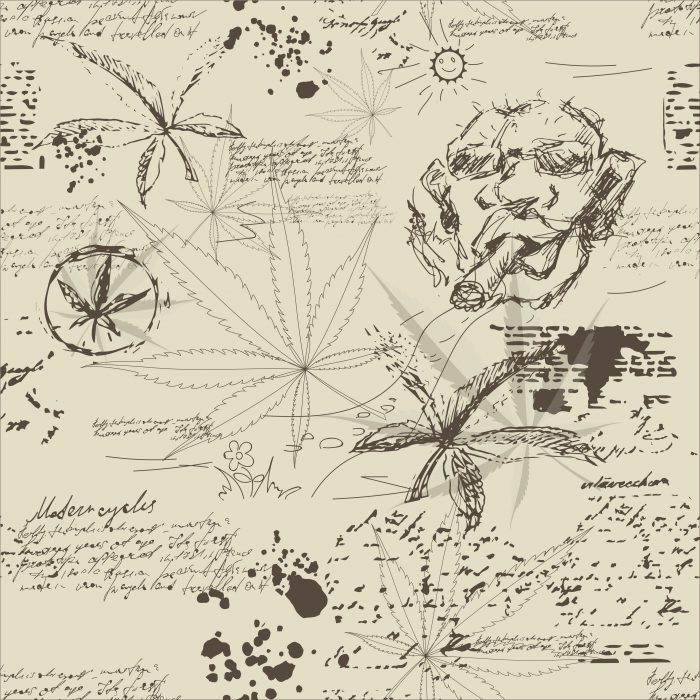Medicinal records start 2500 years ago, but fossilized records date back 27.8 million years.
With increasing cannabis legalization across the United States and new cannabis businesses popping up every day, you would be forgiven for thinking of cannabis as a relatively new medicinal and recreational tool. Archaeological records tell us that cannabis actually has a long history, spanning thousands of years. So how old is the cannabis plant really?
The Cannabis Plant and Western Medicine
Cannabis was a staple of Western medicine long before modern dispensaries. It is largely thought to have been introduced in the latter half of the nineteenth century in the form of extracts and tinctures, although there is some evidence that cannabis seeds may have been used by European physicians earlier that century. And the second half of the nineteenth century saw over a hundred scientific articles published that reviewed the therapeutic properties of cannabis.
Of course, Western medicine was hardly the first to use cannabis as a medicinal or therapeutic tool.

Cannabis and Eastern Medicine
Medical practitioners of the East were far quicker than their Western counterparts to see the cannabis plant as a medicine. In fact, the Pen-ts’ao Ching, the world’s oldest publication of medical drugs, reportedly contains mention of cannabis.
Surgeons compiled Pen-ts’ao Ching in the first century AD. It’s based on medical traditions that surgeons orally passed down from as far back as 2,700 BC. These medical traditions reported cannabis as a treatment for malaria, constipation, pain, and other symptoms. In fact, researchers believe that the founder of Chinese surgery, Hua T’o, used a combination of cannabis and wine as a surgical anesthetic.
History of Cannabis Smoking
The most well-known method of cannabis consumption is smoking. Surely it’s the image most people bring to mind when thinking of cannabis consumption. But how long have people smoked cannabis?
The archaeological evidence for smoking the cannabis plant is limited and hard to verify. But one study has linked a 2,500-year-old wooden brazier to smoking cannabis. A brazier is like a portable fire pit.
Researchers analyzed ten wooden braziers that were exhumed from the Jirzankal (or Quman) cemetery in the Pamir Plateau region of Central Asia, which were in use around 500 B.C.E. The braziers underwent phytochemical analysis and the results indicated that the braziers had burnt cannabis. This suggests that smoking cannabis was a ritualistic or religious activity in China at least 2,500 years ago.
One of the most effective ways of dating a plant is to look at the fossil record. One study analyzed just that for the cannabis plant.
The study’s researchers discovered a possible location for the origin of cannabis at the Tibetan Plateau. But how did they age the cannabis plant?
Fossil Record of Cannabis
It turns out that cannabis actually has a pretty poor fossil print record, with a lack of impressions of cannabis leaves or fruits in rock. To overcome this, paleobotanists turned to microfossils. Fossilized cannabis pollen was much more abundant in the fossil record than plant impressions. Researchers used this to try fill in its history.
However, the researchers found that the cannabis and humulus plants have an almost identical pollen structure. These similarities made identifying fossilized cannabis almost impossible. But thanks to the different environments that the plants typically thrived in, the researchers were able to separate the pollens by identifying cannabis pollen with open grasslands and humulus pollen in forest environments. They used plants typically seen in these different environments as markers.
Once they found the cannabis pollen, they needed to date it. So the researchers turned to radiocarbon dating. Radiocarbon C14 is found in fossilized plant and animal material, and since it degrades at a known rate they are able to determine the age of a fossil by measuring how much C14 is left in the fossil. The oldest pollen found in the study gave a radiocarbon date of 19.6 million years old. But, astounding as that is, it wasn’t the oldest age that researchers gave to cannabis in this study.

Researchers also used a “molecular clock” to try and estimate when cannabis might have diverged from the previously mentioned humulus species. Researchers calculated this clock by using DNA as a measure of time and calibrating it alongside the dates of related fossilized plants. The molecular clocked estimated that cannabis and humulus diverged from one another around 27.8 million years ago.
So Can We Throw Cannabis A Birthday Party?
The use of cannabis as a medicine and psychotropic shows up in ancient records as far as 2,500 years ago. Yet, it potentially dates back to even further than that. Sadly, a lack of oral records prevents us from knowing definitively. In that case, we won’t be able to accurately predict its age to the point of celebrating its birthday.
So while we know that humans have consumed cannabis for thousands of years, what do we know about the plant itself?
Unfortunately, fossilized cannabis, which would be the best way to date cannabis, is not in abundance. So researchers have used alternative dating methods, through microfossils, common plants, and a molecular clock, as proxies in some cases. With the oldest age for cannabis seen at 27.8 million years old, it is important to keep in mind that locking in a specific age for cannabis is likely impossible thanks to the poor fossil record. So, we should view this as more of an indicator.
That said, it’s obvious that people have been consuming cannabis about as long as they’ve been consuming, well … anything. Clearly, it’s time to legalize humans’ oldest medicine.




Denz Jordan
Totally agree with you